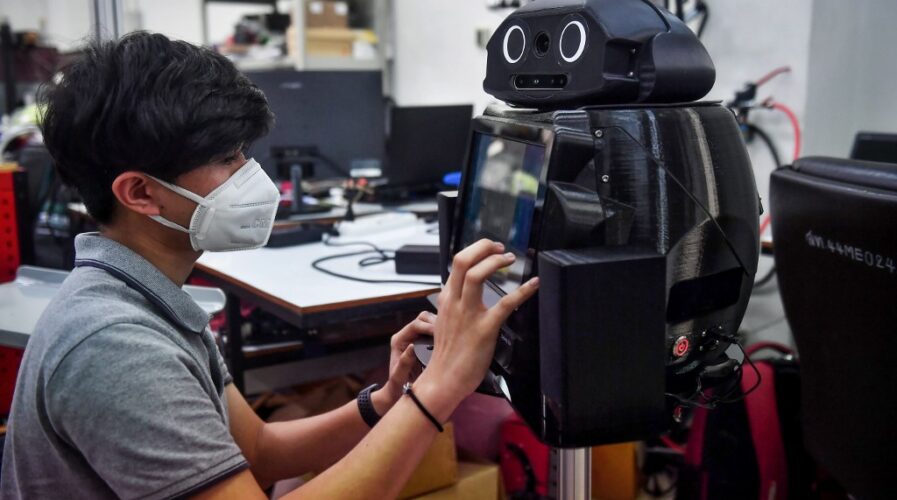
A medical robot modified to screen and observe COVID-19 patients at the Regional Center of Robotics Technology at Chulalongkorn University in Bangkok. Source: AFP
Thailand aims to be the new APAC medical hub leveraging smart health
- Relying on telemedicine and emerging smart health technologies can help Thailand accelerate towards its goal of becoming an APAC medical hub
A number of Southeast Asian (SEA) economies are speeding up their digitization drives on the road to pursuing the Industrial Revolution 4.0, or IR4.0. One of those economies is Thailand, which is restructuring itself into a value-based, innovation-driven economy by looking towards future economic trends, one of which is developing into an Asia Pacific (APAC) medical hub by 2025.
That is one of the stated objectives as part of the country’s Thailand 4.0 initiatives, along with developing towards other topline trends such as robotics, aviation and logistics, biofuels and biochemicals, and digital.
According to its National Broadcasting and Telecommunications Commission (NBTC), advancing Thailand’s healthcare infrastructure to become an APAC medical hub within five years will require significant technological development in telehealth, smart medical applications, and robotics.
Much of telehealth and other medical tech development will, in turn, be reliant on the progress of related technologies like artificial intelligence (AI) and big data, which can be used to support data analytics and medical services.
Leveraging smart health tech and robotics at their most efficient capacities will also be dependent on the reliable availability of 5G connectivity in hospitals and medical centers, as they were earlier this year when Thailand’s two biggest telcos rolled out 5G to support local hospitals as they coped with the influx of pandemic-related patients.
Introducing 5G networks and spurring technology infrastructure development has been in line with the NBTC’s telecommunications and business strategy of creating an intertwined ecosystem linking government agencies and private sectors, especially content providers and SMEs who all stand to benefit from leveraging on these technologies.
Harnessing medical technology towards becoming a regional medical hub is also in compliance with the NBTC’s ongoing 5G technology development plan, which has progressed since the 5G first wave frequency auction that was held in February of this year. In addition, Thai mobile operators Advanced Info Service (AIS) and True Corp. are inducing 5G network rollouts throughout the country, especially along the Eastern Economic Corridor (EEC) to support 5G applications in vertical sectors.
Theetanun Rattanasanyanuphap, the executive director of Telecommunications Policy and Resource Management Bureau at the NBTC, told the Bangkok Post that harnessing data analytics along with 5G and cloud computing infrastructure helps create value towards the country’s medical hub aspirations, as they support next-generational smart healthcare applications.
“NBTC is studying international guidelines for promoting 5G deployment and creating incentive policies to promote investment in digital infrastructure and services, and encourage the use of digital technologies in healthcare,” she said. “The Smart Hospital initiative, with the support of efficient telecommunications infrastructure is an aspect that helps us achieve the Thailand 4.0 policy goal.”
The executive director added that smart healthcare and the medical hub goals will help “provide opportunities for investment and business expansion” in Thailand.
READ MORE
- Strategies for Democratizing GenAI
- The criticality of endpoint management in cybersecurity and operations
- Ethical AI: The renewed importance of safeguarding data and customer privacy in Generative AI applications
- How Japan balances AI-driven opportunities with cybersecurity needs
- Deploying SASE: Benchmarking your approach


